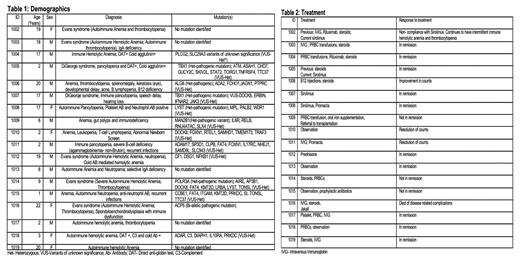Abstract

Abstract Autoimmune cytopenias are characterized by autoimmune hemolytic anemia (AIHA), immune thrombocytopenia (ITP), and/or autoimmune neutropenia. Evans syndrome (ES) is a condition characterized by simultaneous or sequential development of AIHA and ITP and/or immune neutropenia. Inborn errors of immunity driven multilineage cytopenias including ES requires further characterization to identify therapeutic targets. We evaluated our cohort of children with immune cytopenias to characterize mutations in inborn disorders of immunity and response to targeted therapy. To this end, we retrospectively reviewed the medical records of children between the ages of 0-21 years who presented to our hematology clinic with recurrent immune cytopenia between the years of 2018-2021. Rheumatological diseases, lymphoproliferative disorders, bone marrow failure syndromes, infections, drugs, toxins and metabolic disorders were excluded in the study. Children presenting with isolated idiopathic thrombocytopenic purpura or neutropenia were also excluded from the study. We utilized lymphocyte immunophenotyping and next generation sequencing involving 474 known genes (Invitae: Test code-08100) causing primary immunodeficiency in our pediatric patients with recurrent AIHA or multilineage immune cytopenias.
Of the 59 patients with AIHA and multilineage immune cytopenias, 18 (30.5%) had recurrence of cytopenias after initial diagnosis. The age ranged from 1-20 years and 33% (n=6) were of the female gender (Table 1). AIHA (n=5, 28 %) and ES (n=5, 28%) were the most common presentation in patients with recurrent cytopenias. Autoimmune pancytopenia (n=4, 22.2%) was another common presentation. One child progressed to autoimmune pancytopenia after being diagnosed with AIHA. Pathogenic mutations in inborn errors of immunity were identified in 38.8% of the children. No mutations or variants were identified in 5 children (28%).
Majority of patients received immunomodulatory treatments (Table 2) which resulted in remission (n=12, 66.6%). Immune cytopenias associated with Di-George syndrome were responsive to sirolimus with both children attaining remission. There was a death in the cohort related to the underlying condition.
In conclusion, inborn errors of immunity were identified in recurrent immune cytopenias. Targeted therapies helped to achieve durable remission in children with specific mutations. Larger studies are warranted to understand the long-term therapeutic response in these children.
Disclosures
Sathi:Vertex pharmaceuticals: Consultancy. Balasa:CSL Behring: Speakers Bureau; Sanofi: Speakers Bureau; Takeda: Speakers Bureau.
Author notes
 This icon denotes a clinically relevant abstract
This icon denotes a clinically relevant abstract
Asterisk with author names denotes non-ASH members.


This feature is available to Subscribers Only
Sign In or Create an Account Close Modal